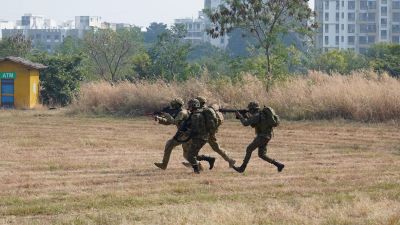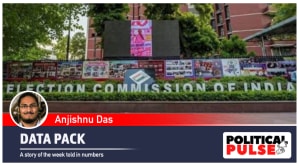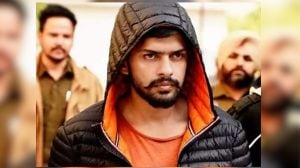Gaurav yatra politics is out
Narendra Modi has given the credit to the ‘pseudo secularists’ and their restraint in the choice of language for the comparative p...

Narendra Modi has given the credit to the ‘pseudo secularists’ and their restraint in the choice of language for the comparative peace in the wake of the attack on the Akshardham Temple. The truth, however, is that politics has undergone a change in the post-Akshardham phase. Today, BJP’s compulsions are very different from what they were in the post-Godhra period.
The experience of five decades has shown that riots usually take place when some political group stands to gain from inciting one side or the other. No organised group is interested in fanning violence today. That is why even the VHP’s all-India ‘bandh’ passed off fairly peacefully. Both the PM and Deputy PM made it clear to Modi that there was to be no Godhra II. Then, of course, there was the international angle. Both Vajpayee and Advani have had to condemn Gujarat as a national shame while abroad in the wake of criticism from the world community. The post-Godhra riots had detracted from India’s USP — the ability of religious groups to coexist peacefully — and has given a handle to Musharraf to argue that it did not need Pakistan to send armed men into Gandhinagar after the way Muslims had been treated in Gujarat.
Internally, too, there was an assessment that beyond a point extreme rhetoric and violence was becoming counter-productive. As it is, after the initial polarisation, the damage to Gujarat’s economy and image, the fanatic overtones in Modi’s speeches, the unsettled situation and the uncertainty over the election timing, have made many Gujaratis uneasy, particularly those who had gravitated to the BJP for reasons other than Hindutva. The Congress was beginning to make headway in bringing the debate back to the evaluation of the government’s performance.
But Akshardham has changed all that. It has made the gaurav yatra defunct. The BJP does not now need riots now. The attack on the temple may reinforce in Hindus a feeling of being besieged, even though the sentiment may not necessarily get expressed immediately. The coming days are unlikely to see reprisals against the Muslims for what happened in Gandhinagar. But it may well give strength to the BJP, and it now suits the party to show that it can control the situation and get on with governance.
The government has announced that the two terrorists who stormed the temple precincts were Pakistanis, although there are several aspects of the commando operation that need explaining. Modi has dismissed the letters, found on the two terrorists claiming revenge as their motivation, as a deliberate ploy to mislead investigators. There is no doubt that the attack on the Swaminarayan temple — revered in Gujarat and among Hindu NRIs — showed a great deal of planning. It was calculated to provoke Hindus and tear apart the country’s secular fabric.
|
The BJP leadership will have to decide what to do with Modi |
Whether or not the terrorists were abetted by some local people or not, Akshardham is a wake up call. Even if one was to accept the BJP’s logic that the three-month long violence against the Muslims was a natural expression of Hindu anger over Godhra, the government has done little to apply a healing touch to the wounds of the Muslims. Instead, Modi has only continued to create fresh wounds with his derogatory references in his speeches. A day after he was ticked off by L.K. Advani for the ‘hum paanch, humare pachhis’ statement, an unrepentant Modi only went a step further, saying, ‘Hum paanch, humare chae sau pachhis’, urging presspersons to make a note of it.
The BJP leadership will have to decide what to do with Modi, who is turning out to be a loose canon at a point of time where there is too much at stake, both nationally and internationally. Muslims continue to be unemployed, ghettoised and terrorised in post-Godhra Gujarat. Remember, too, that it is a border state with all the complications that this poses. Pakistan would be only too willing to fish in troubled waters. We would also do well to remember that terrorism is not the same as communalism. Even if a few local Muslims aided the terrorists from outside in Gandhinagar, all Muslims cannot be branded as anti-national or anti-Hindu, just as all Hindus cannot be held responsible for the violence unleashed against the Muslims in Gujarat. To fall into this trap is to invite trouble for our pluralistic society.
It is also time we came out against both majority and minority communalism. Let’s face it. Akshardham was a terrorist attack but it was mounted against Hindu religious symbol. Godhra was a communal act by the Muslims. The post Godhra violence was a communal act by the Hindus. For too long politicians have been selective in their criticism of such acts and that is one reason why the communal divide is increasing today.




- 01
- 02
- 03
- 04
- 05

























